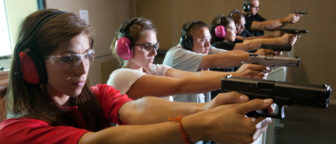An AR-15, when fired, sends bullets into soft flesh and shreds organs beyond repair, according to a trauma surgeon who treated victims from the Parkland, Fla., school shooting on Feb. 14.
![]() The shooting left 17 students and faculty members dead. It was one of the deadliest shootings in the United States. Three of those have happened in the last five months.
The shooting left 17 students and faculty members dead. It was one of the deadliest shootings in the United States. Three of those have happened in the last five months.
This shooting looked like it could be a tipping point in the discussion about how to stop the carnage. Immediately—and inexplicably, considering the $30 million the National Rifle Association contributed to his 2016 presidential campaign—President Donald J. Trump said he supported raising the minimum age for buying a gun to 21. He also said senators who refused to act are “afraid of the NRA.”
But that was just chatter. Trump and Vice President Mike Pence met with Chris W. Cox, the executive director of the lobbying arm of the NRA, and the president tweeted: “Good (Great) meeting in the Oval Office tonight with the NRA!”
And that was that for any more meaningful White House conversation on sensible gun legislation. Instead, Trump has focused on arming teachers, an idea that has been dismissed by educators, insurance companies, civil rights organizations, and scientists. Arming teachers runs counter to any existing data on mass shootings.
Brave students took to social media to keep their conversation alive. Hundreds of thousands of students walked out of their classrooms on the one-month anniversary of the shooting. They want assault weapons banned and universal background checks.
The FBI studied 160 cases of active shooters (including Connecticut’s Sandy Hook Elementary shootings) between 2000-2013, in which 1,043 people were killed or wounded (the FBI did not include the shooters in the total). Half of the shooting incidents were ended by the shooter’s own initiative, either by suicide or because the shooter fled the scene. Twenty-one of the incidents were ended when unarmed civilians restrained the shooter.

iStock Photo.
The two teachers’ unions in Connecticut oppose the president’s proposal to arm teachers.
None of the shooters was stopped by a civilian with a gun—say, a teacher. Any one with a gun who successfully stopped a shooter with a gun was either active duty military, a security guard, or a police officer. Trump has watched too much television, where the good guys drop the bad guys with one shot. Mass shootings are chaotic and dangerous—the same FBI report said that “in 21 of the 45 incidents where law enforcement had to engage the shooter to end the threat, nine officers were killed and 28 were wounded.” The report also said that in the 63 incidents where researchers could determine how long the shooting lasted, nearly 70 percent ended in 5 minutes or less. Twenty-three ended in two minutes or less.
There are other reasons to dismiss this idea. Insurance companies tend to balk at the presence of guns on school grounds. And arming teachers overlooks the potential for misfiring based on implicit bias. A University of North Carolina study looked at so-called weapon bias, where, in experiments, people tended to falsely claim they’d seen a weapon when the face that was shown was black, as opposed to when the face was white.
No amount of training will change that. And sometimes, no training is enough. Earlier this week, a California teacher – a reserve police officer, no less – accidentally fired his gun in a classroom and injured a student. And, a school resource officer accidentally fired his gun inside a school in Alexandria, Virginia.
Donald E. Williams Jr., executive director of Connecticut Education Association, has said more guns would not protect students. The president of Hartford Federation of Teachers, Andrea Johnson, told the Courant that arming teachers is the “the most horrendous, horrible idea that’s come down from this president, ever.” The only reason to arm teachers is to follow the blood-gargling NRA’s agenda of selling more guns. We need universal background checks, for starters. And we need to remove some of the more powerful weapons from the marketplace. We need to have the moral fortitude to use data-driven solutions, and stop the worthless chatter.
Susan Campbell is a distinguished lecturer at the University of New Haven. She can be reached at slcampbell417@gmail.com.